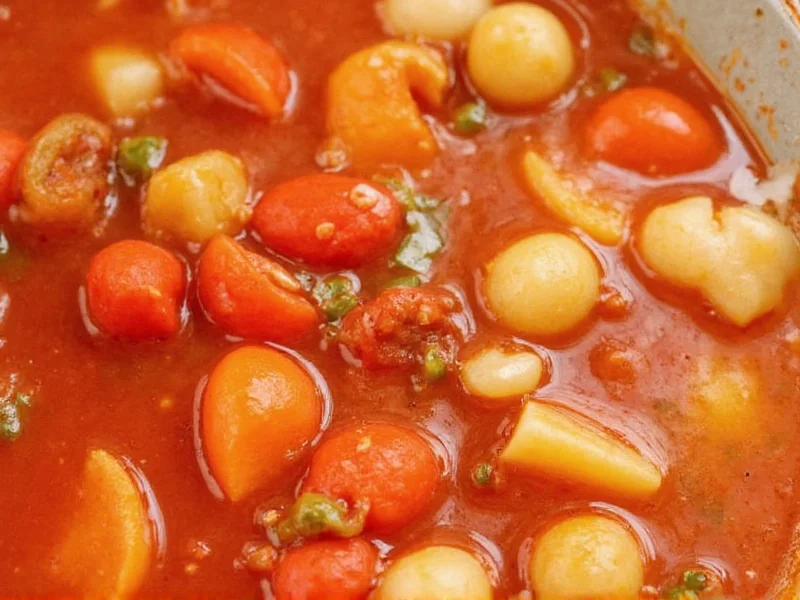Understanding canned soup expiration requires distinguishing between safety and quality. While the U.S. Department of Agriculture states that properly stored canned goods remain safe indefinitely, practical shelf life for optimal taste and nutritional value is more limited.
Decoding Canned Soup Date Labels
Most canned soups display one of three date types:
| Date Type | Meaning | Shelf Life Guidance |
|---|---|---|
| "Best By" or "Best Before" | Peak quality period | 2-5 years for unopened cans stored properly |
| "Use By" | Recommended consumption date for quality | 3-4 years for most canned soups |
| "Expires On" | Rarely used for shelf-stable canned goods | Check can condition regardless of date |
Actual Shelf Life of Canned Soup
When stored in a cool, dry place away from temperature fluctuations, unopened canned soup maintains:
- Optimal quality: 1-2 years past printed date
- Good quality: 2-3 years past printed date
- Safe for consumption: 3-5 years past printed date (with quality decline)
Once opened, transfer unused soup to a glass or plastic container and refrigerate. Consume within 3-4 days for best quality and safety. Never store opened soup in the can, as metal can leach into the food.
Factors Affecting Canned Soup Longevity
Several conditions impact how long canned soup remains safe and palatable:
- Storage temperature: Ideal storage is between 50-70°F (10-21°C). Higher temperatures accelerate quality loss
- Can integrity: Dents larger than a dime, especially on seams, compromise safety
- Storage position: Store cans upright to prevent liquid from contacting the lid seal
- Humidity: High moisture environments promote rust formation
How to Tell If Canned Soup Has Spoiled
Before consuming canned soup past its date, perform these safety checks:
- Examine the can: Discard if bulging, deeply dented, rusted through, or leaking
- Listen when opening: Hissing or spurting liquid indicates potential spoilage
- Check appearance: Look for mold, unnatural cloudiness, or separation that doesn't mix when stirred
- Smell test: Trust your nose—sour, rancid, or 'off' odors mean discard immediately
- Texture check: Slimy or unexpected thickening indicates spoilage
When in doubt, throw it out. Foodborne illness from spoiled canned goods can cause serious health issues, particularly with low-acid foods like most soups.
Maximizing Canned Soup Shelf Life
Follow these best practices to extend your canned soup's usability:
- Store in a cool, dark pantry away from heat sources like ovens or dishwashers
- Maintain consistent temperatures—avoid areas with daily temperature swings
- Rotate stock using the 'first in, first out' method
- Wipe cans clean before storage to prevent dust buildup on seals
- Consider transferring contents to food-grade containers if storing long-term
Common Misconceptions About Canned Soup Expiration
Several myths persist about canned food safety:
- Myth: Canned soup becomes unsafe immediately after the printed date
Fact: The date refers to quality, not safety. Properly stored cans remain safe well beyond this date - Myth: All dented cans are dangerous
Fact: Only deep dents on seams or with sharp points compromise safety - Myth: Canned soup loses all nutritional value over time
Fact: While some vitamins degrade, protein and mineral content remains stable for years
When to Definitely Discard Canned Soup
Immediately discard canned soup showing any of these warning signs:
- Bulging or swollen cans (indicates potential botulism risk)
- Rust that has penetrated through the can
- Leaking or compromised seals
- Soup that foams or bubbles when opened
- Unnatural colors or mold growth
Remember that low-acid canned foods like most soups create ideal conditions for Clostridium botulinum bacteria if compromised. When dealing with potentially spoiled canned goods, never taste to check—rely on visual and olfactory indicators.
Practical Storage Timeline for Canned Soup
Use this reference for managing your canned soup inventory:
| Storage Duration | Quality Status | Recommended Action |
|---|---|---|
| 0-1 year past date | Peak quality | Enjoy as intended |
| 1-2 years past date | Minor quality decline | Use in cooking where flavor is enhanced |
| 2-3 years past date | Noticeable quality changes | Check thoroughly before use; best for emergency储备 |
| 3-5 years past date | Significant quality degradation | Only use if can is perfect condition; inspect carefully |
| 5+ years past date | Unpredictable quality/safety | Discard unless in documented emergency situation |
Proper food storage knowledge helps reduce waste while maintaining safety. By understanding the realities of canned soup expiration, you can make informed decisions about your pantry staples without unnecessary food waste.











 浙公网安备
33010002000092号
浙公网安备
33010002000092号 浙B2-20120091-4
浙B2-20120091-4